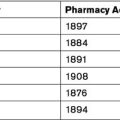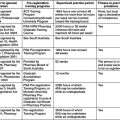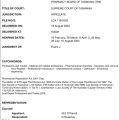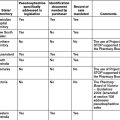Chapter 3 Ethics and professional conduct
ETHICS
As stated, ethics can be described as the study of what should be done in a given situation. The Macquarie Dictionary offers a definition of ethics as ‘a system of moral principles by which human actions and proposals may be judged to be good or bad or right or wrong’ and goes on to say ‘the rules of conduct recognised in respect of a particular class of human actions’.[1] While these definitions may be superficially attractive, closer examination reveals other questions that need to be addressed. In the first part it could reasonably be asked which system of moral principles would be invoked when judging an action or a proposal; in the second, who defines the rules of conduct and whose interests are being served by those ‘rules’?
While it is difficult to concisely define ethics other than to say ethics is ‘what should be done in a given situation’ or consider it in the terms of ‘…do unto others as you would have them do unto you’, some authors, in an effort to further clarify matters, have found it useful to say what ethics is not.[2, 3]
Further consideration of ethics may reveal the ethical field can be divided into normative ethics and meta-ethics.[4] ‘Normative ethics’ attempts to develop moral principles or rules to guide our action and judge our behaviour, while ‘meta-ethics’ is concerned with the meaning of terms such as ‘right’, ‘justice’, ‘common good’, and ‘virtue’. One class of normative ethics is ‘practical ethics’ which considers those questions that arise in specific contexts, such as the biological sciences. It is here that bioethics is located, which includes ‘medical ethics’, ‘nursing ethics’ and ‘pharmacy ethics’ as subsets.
Lewins has in fact argued that any study of bioethical issues is dichotomous in nature in that it contains two distinctly different approaches.[5] The first he termed the academic approach, which poses and attempts to answer questions of an ethical nature in health care, such as those relating to issues of abortion, life support and the allocation of resources. The second, the imperative approach, is where behaviour is standardised via modification and control through the development of certain structures, such as hospital-based ethics committees or the formulation of codes of conduct.
PHARMACY AS A PROFESSION
The Macquarie Dictionary defines a profession as a ‘…vocation requiring knowledge of some department of learning or science…’[1] However, this definition could be considered unnecessarily narrow and not accounting for other factors beyond the mere existence of a body of knowledge. Appelbe and Wingfield have suggested a series of tests that characterise a profession in contemporary society.[6] As well as an intellectual discipline and requisite standard of knowledge, these tests also include:
… agree to conscientiously serve the public interest, even when the public interest conflicts with self-interest. Based on this agreement society in return allows the profession certain privileges. The idea of self-regulation that most professionals enjoy is one of those privileges. The core of this privilege involves accountability to and sanctioning by one’s professional peers — a professional web that has agreed to serve the common good …[7]
Application of the third and fourth tests — standards of conduct and service and advice – can be satisfied by the existence of relevant codes of ethics or conduct together with standards of practice that address matters relating to professional conduct, service and advice. In Australia the PSA has adapted the Code of Professional Conduct from the Royal Pharmaceutical Society of Great Britain Code of Ethics[8] This has been adopted or otherwise recognised to one degree or another by Australian pharmacy registering authorities.
Professional conduct
The Code has not been presented in a legally rigorous manner, nor does it present all circumstances which might be considered inappropriate or unacceptable conduct. Rather it establishes a set of fundamental principles to guide pharmacists in discharging their responsibility in relation to maintaining and improving the health and wellbeing of clients and the Australian community.[9]
Principle one
This principle goes to the core of being a profession where the object is one where public service is paramount even when the public interest conflicts with self-interest. There are three obligations that accompany this principle. Obligation two is worthy of some consideration as it states in part that ‘A pharmacist must not purchase, sell or supply any medicinal product where there is a reason to doubt its safety, quality or efficacy…’. This raises the issue of the sale of some over-the-counter and complementary and alternative medicines in pharmacies, where many of these products are subject to extravagant and unsupported claims as to their efficacy.[10]
Principle three
A pharmacist must respect the confidentiality of information acquired in the course of professional practice relating to clients and their families. Such information shall not be disclosed to anyone without the consent of the client. Exceptions may arise where the health of the client or others is at risk, where information is sought by an office of a statutory authority empowered under legislation, where a court order requires the release of confidential information, or the information is released to those assuming responsibility for the patient (e.g. next-of-kin, parent, relative, guardian or anyone with powers of attorney).
This principle has been overtaken somewhat by the 2001 amendment to the Privacy Act 1988 (Cth) which established 10 National Privacy Principles (NPPs). The NPPs apply to organisations, which includes all those providing a health service. The Privacy Act 1988 (Cth) is discussed in Chapter 9.
Principle four
Obligation three under this principle states ‘A pharmacist shall provide professional advice and counselling at every appropriate opportunity to ensure the patient and/or carer are sufficiently informed about the safe and effective use of their medications and to achieve optimal outcomes’. However, in a recent paper reporting on pharmacists’ counselling practices in metropolitan and rural settings, Puspitasari, Aslani and Krass, found it somewhat disturbing ‘that not all respondents were highly likely to counsel on all new prescriptions’.[11] Also in a previous report to the Australian Health Ministers’ Conference the National Coordinating Committee on Therapeutic Goods stated there appeared to be ‘… considerable disparity in the level of counselling delivered and in some cases of supplying S3 medicines where no counselling had been delivered at all’. This was identified in the report with some level of concern as the lack of counselling not only did not comply with the S2/S3 Standards, but was also in breach of state and territory legislation.[12]
Principle six
This principle requires a pharmacist to maintain effective professional relationships with other health professionals where deemed to be in the best interests of the patient and having due regard for a patient’s right of confidentiality. A pharmacist should not enter into any arrangement that could be perceived as fraudulent or unethical or which may compromise their professional judgment. For example, an arrangement with a local medical practitioner that involved the supply on prescription of testosterone enanthate to a client for the sole purpose of enhanced athletic performance could be judged to be unethical. Such a supply would not be for any recognised indication and, in addition, would pose significant and unacceptable long-term risks to the patient. In such a circumstance it may not be unreasonable for a regulatory body to conclude that the action of the pharmacist was unethical.
Principle nine
Ensure that if your religious or moral beliefs prevent you from providing a particular professional service, the relevant persons or authorities are informed of this and patients are referred to alternative providers for the service they require. (Section 3.4)[13]
Neither the Society of Hospital Pharmacists of Australia Code of Ethics[14] or the American Society of Health System Pharmacists Code of Ethics for Pharmacists[15] include such a requirement.
Ethical decision-making and practice
While there is, for example, no law that requires a pharmacist to dispense a medicine, or supply a good or a service, Principle nine of the PSA Code of Professional Conduct requires that ‘a pharmacist shall ensure continuity of care for the client in the event of … conflict with personal moral beliefs’ with an obligation ‘when required [to] assist and refer clients to another pharmacist in order to maintain service and care’. In addition, Principle two of the same code obligates the pharmacist to ‘…uphold the reputation of the profession and adhere to the legislation applicable to the practice of pharmacy …’. In a recent position paper addressing the ethical issues relevant to declining to supply, the PSA ‘… recognises and respects the right of individuals, including health professionals, to hold a moral belief on particular issues …’ and further recognises that ‘… at times these moral beliefs may impact on the roles undertaken by those health professionals …’.[16]
While there is a lack of case law in such matters in Australia, recently the United States District Court issued an injunction directing the Board of Pharmacy in Washington State not to enforce their new pharmacist/pharmacy responsibility rules. The rule in question did not allow one pharmacy to refer a patient to another pharmacy for the purpose of avoiding filling a prescription due to moral or ethical objections. The matter was brought before the court by three pharmacists who believed they were being forced to supply emergency contraception when such an action conflicted with their personal beliefs. The injunction in this case was specific to the dispensing of emergency contraception; an appeal for a stay of the District Court’s injunction was denied.[17]
Unsatisfactory professional conduct
Although the nature of ‘unsatisfactory professional conduct’ in the legal sense is extensively addressed in Chapter 7, it is also relevant to any discussion of professional practice and ethics. The provisions in the pharmacy legislation in each of the jurisdictions that identify the conduct or behaviour of a pharmacist that may result in disciplinary proceedings are not uniform. Such conduct is defined inconsistently in Australian regulatory pharmacy legislation where various terms are used including ‘unethical or discreditable conduct’, ‘professional misconduct’, ‘unsatisfactory professional conduct’, ‘unprofessional conduct’, ‘carelessness’, ‘incompetence’, ‘impropriatory’, ‘misconduct or infamous conduct in a professional respect’. Although the intention of the legislation in the various jurisdictions appears to overlap, the inconsistent use of terminology can impact on disciplinary outcomes as evidenced in the decision of an appeal to the Supreme Court of Tasmania in Adamson v Pharmacy Board of Tasmania [2004] TASSC 32. In this case a clear distinction was made between a pharmacist’s professional misconduct and unprofessional conduct, where the former was defined as ‘behaviour on the part of a member of a profession that would reasonably be regarded as disgraceful or dishonest by members of the profession of good repute and competency’, and the latter as ‘conduct may reasonably [be] held to violate or fall short of, to a substantial degree, the standard of professional conduct observed or approved by members of the professional of good repute and competency’. Professional misconduct was therefore regarded as a more grave categorisation of misconduct than unprofessional conduct.
Thus, it follows from ‘professional conduct which is of a lesser standard than that which might reasonably be expected of the registrant by the public or the registrant’s professional peers’, conduct that is non-compliant with a code of ethics otherwise recognised by a board would permit a board to conclude the actions of a pharmacist may constitute ‘unsatisfactory professional conduct’ and thus initiate disciplinary action. It could be argued that an adopted code of professional conduct represents a standard against which both peers and the public may measure the actions of an individual pharmacist and non-compliance may represent ‘unsatisfactory professional conduct’.
1 Macquarie Dictionary. Online. Available: www.macquariedictionary.com.au [accessed 19 Mar 2009]
2 Singer P. Practical Ethics, 2nd edn. Cambridge: Cambridge University Press; 1999. 1–8
3 Markkula Centre for Applied Ethics. A Framework for Thinking Ethically. Online. Available: www.scu.edu/ethics/practicing/decision/framework.html [accessed 3 November 2008]
4 Holm S. Ethical Problems and Clinical Practice. Manchester: Manchester University Press; 1997. 23–5
5 Lewins F.W. Bioethics for Health Professionals: an Introduction and Critical Approach. Macmillan; 1996. 10–15
6 Appelbe G.E., Wingfield J. Pharmacy Law and Ethics, 6th edn. London: The Pharmaceutical Press; 1997.
7 Ross S. Regulation of the Professional & Matters of Conscience. Online. Available: www.ethics.org.au/about-ethics/ethics-centre-articles/ethics-subjects/professions-and-public-sector/article-0017.html [accessed 14 April 2008]
8 Royal Pharmaceutical Society of Great Britain. Medicines, Ethics and Practice: a Guide for Pharmacists, 18th edn. London: Royal Pharmaceutical Society of Great Britain; 1997. 69–88
9 Pharmaceutical Society of Australia. Code of Professional Conduct. Australian Pharmaceutical Formulary and Handbook (20th edn) Pharmaceutical Society of Australia, Deakin, ACT: 358–9
10 Harvey K.J., Korczak V.S., Marron L.J., Newgreen D.B. Commercialism, choice and consumer protestion: regulation of complementary medicines in Australia. Medical Journal of Australia. 2008;188(1):21-25.
11 Puspitasari H.P., Aslani P., Krass I. How do Australian metropolitan and rural pharmacists counsel consumers with prescriptions? Pharmacy World & Science. 2009;31(3):394-405.
12 National Coordinating Committee on Therapeutic Goods. A report to the Australian Health Ministers’ Conference on the results of research into: A cost benefit analysis of Pharmacist Only (S3) and Pharmacy Medicines (S2) and risk-based evaluation of the standards. August 2005. Online. Available: http://tga.health.gov.au/meds/s2s3report.htm [accessed 3 November 2008]
13 Royal Pharmaceutical Society of Great Britain. Code of Ethics for Pharmacists and Pharmacy Technicians. 2007. Online. Available: www.rpsgb.org/pdfs/coeppt.pdf [accessed 30 May 2009]
14 Society of Hospital Pharmacists of Australia. Code of Ethics. 2006.Online. Available: www.shpa.org.au/docs/ethics.html [accessed 30 May 2009]
15 American Society of Health System Pharmacists. Code of Ethics for Pharmacists. 1994.Online. Available: www.ashp.org/DocLibrary/BestPractices/CodeofEthics.aspx [accessed 30 May 2009]
16 Pharmaceutical Society of Australia. Ethical Issues in Declining to Supply. Online. Available: www.psa.org.au/site.php?id=38 accessed 14 April 2008]
17 Kimbol AF. To Plan B or Not to Plan B: Stormans, Inc. v. Selecky and the Pharmacists’ Right to Conscience. 2008. Online. Available: www.law.uh.edu/healthlaw/perspectives/2008/(AK%20Plan%20B.pdf) [accessed 3 November 2008]






